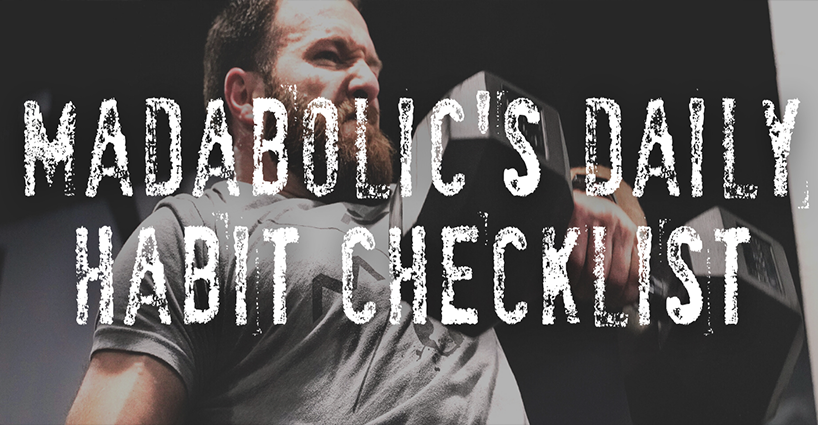Eat less, move more.
No days off.
Go balls to the wall every time you exercise.
If you didn’t sweat buckets, it wasn’t a worthwhile workout.
Cut carbs and train fasted.
These are the philosophies that pop culture has driven down the uneducated consumers throat. It’s what gen pop thinks they need to do to reach their health goals. And it’s where the fitness industry has gone so very wrong…because THESE are the exact philosophies that can and will hold you back from achieving meaningful progress.
At the end of the day, these outdated schools of thought all undermine one fundamentally crucial component to a sound and progress-forward fitness approach: recovery.
You can be the most driven, goal-oriented fitness enthusiast on the planet, but without an intentional recovery plan, your goals and progress will only continue to circle the drain. We’d argue that for many, committing to a recovery plan requires more discipline than committing to a workout routine.
With that, we bring you MADabolic’s Recovery Commandments:
- Commit to NO MORE than 4x MADabolic workouts per week. Anything beyond that is unnecessary, promotes overtraining, and risks burnout and overuse injuries. We love seeing you all in the MADhouse, but if we start regularly seeing you 5+ times per week, we’re gong to have some words.
- Honor your active recovery and scheduled rest days. Commit to NO LESS than one full blown day of rest per week (if not two), and leverage your remaining non-MAD days as opportunities for active recovery. Think: deep stretch, a breezy walk, or an easy bike ride.
- EAT! <1500 calorie diets are appropriate for approximately…no one. You don’t need to train to earn the right to eat. You need to EAT to earn the right to train. Consistently under-fueling will only make your workouts feel slower and weaker, and you’ll shortchange your ability to gain strength. Spend the majority of your year eating at maintenance periodized with 1-2 short term calorie deficits if you have a fat loss goal, or 1-2 structured calorie surpluses if you have a muscle gain goal.
- Stick with a high protein diet. Consider consuming 0.8-1.1g of protein per pound of bodyweight on the daily to support muscular repair and growth.
- Welcome carbohydrates into your diet. Carbs are our bodies’ preferred source of energy, and directly impact post-workout recovery. Adequate daily carb intake juices up your glycogen tank, which your body taps into not only to fuel your workouts, but also to recover from them.
- Do NOT eat less just because it’s a rest day. It can take 24-72 hours for glycogen levels to replenish after a training session, so slashing calories just because it’s a rest day is counterproductive. By eating the same amount on a rest day, you’ll better support your post-workout recovery efforts and will also front load your glycogen stores for the workout ahead. Not to mention, taking in a routine amount of calories each day better promotes consistency in your habits.
- Drink plenty of water. Because you’re not a cactus. Hydration is an essential part of post workout recovery – it helps lower body temperature and heart rate, lubricates the joints, delivers post-workout nutrients to your muscle cells, deters cramping, and can alleviate soreness and fatigue.
- Take your fish oil! The EPA/DHA profile in Stronger Faster Healthier’s fish oil hits hard in post-exercise recovery. Strength training in the MADhouse increases inflammation and muscle oxidation. Reducing this response through daily, high quality fish oil supplementation is benficial in improving exercise recovery, reducing soreness, and preparing your body for its next bout of exercise-induced stress. TLDR: constantly sore? Take your damn fish oil!
- Aim for a minimum of 7 hours of sleep per night. Sleep debt is physiologically stressful enough. Add the stressors of 4 weekly training sessions into your routine and a possible calorie deficit into the mix, and you’re basically signaling to injury, suboptimal hormonal function, low sex drive, irritability, and cognitive depletion that you’re open for business.



